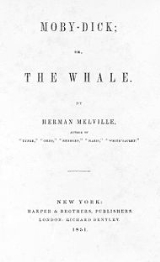
and first published in 1851. It is considered by some to be a Great American Novel and a treasure of world literature
. The story tells the adventures of wandering sailor Ishmael
, and his voyage on the whaleship
Pequod
, commanded by Captain
Ahab. Ishmael soon learns that Ahab has one purpose on this voyage: to seek out a specific whale--Moby Dick, a ferocious, enigmatic white sperm whale
.
Call me Ishmael. Some years ago — never mind how long precisely — having little or no money in my purse, and nothing particular to interest me on shore, I thought I would sail about a little and see the watery part of the world. It is a way I have of driving off the spleen and regulating the circulation.
![]()
The act of paying is perhaps the most uncomfortable infliction that the two orchard thieves entailed upon us.
![]()
Yes, as every one knows, meditation and water are wedded for ever.
![]()
Why did the old Persians hold the sea holy? Why did the Greeks give it a separate deity, and own brother of Jove? Surely all this is not without meaning. And still deeper the meaning of that story of Narcissus, who because he could not grasp the tormenting, mild image he saw in the fountain, plunged into it and was drowned. But that same image, we ourselves see in all rivers and oceans. It is the image of the ungraspable phantom of life; and this is the key to it all.
![]()
As most young candidates for the pains and penalties of whaling stop at this same New Bedford, thence to embark on their voyage, it may as well be related that I, for one, had no idea of so doing.
![]()
It seemed the great Black Parliament sitting in Tophet. A hundred black faces turned round in their rows to peer; and beyond, a black Angel of Doom was beating a book in a pulpit. It was a negro church; and the preacher's text was about the blackness of darkness, and the weeping and wailing and teeth-gnashing there. Ha, Ishmael, muttered I, backing out, Wretched entertainment at the sign of 'The Trap!'
![]()
Better sleep with a sober cannibal than a drunken Christian.
![]()
But oh! shipmates! on the starboard hand of every woe, there is a sure delight; and higher the top of that delight, than the bottom of the woe is deep. Is not the main-truck higher than the kelson is low? Delight is to him — a far, far upward, and inward delight — who against the proud gods and commodores of this earth, ever stands forth his own inexorable self.
![]()
And eternal delight and deliciousness will be his, who coming to lay him down, can say with his final breath — O Father! — chiefly known to me by Thy rod — mortal or immortal, here I die. I have striven to be Thine, more than to be this world’s, or mine own. Yet this is nothing: I leave eternity to Thee; for what is man that he should live out the lifetime of his God?![]()

